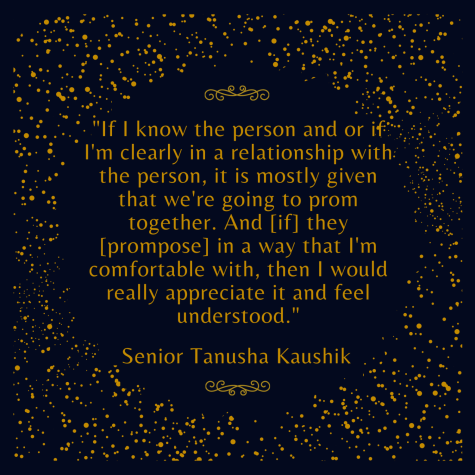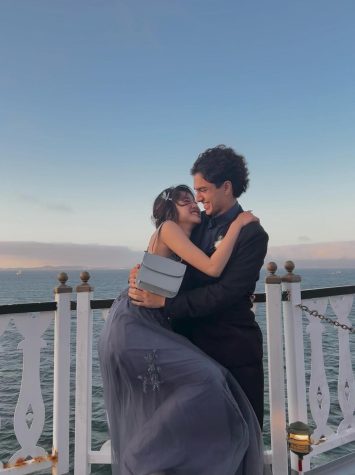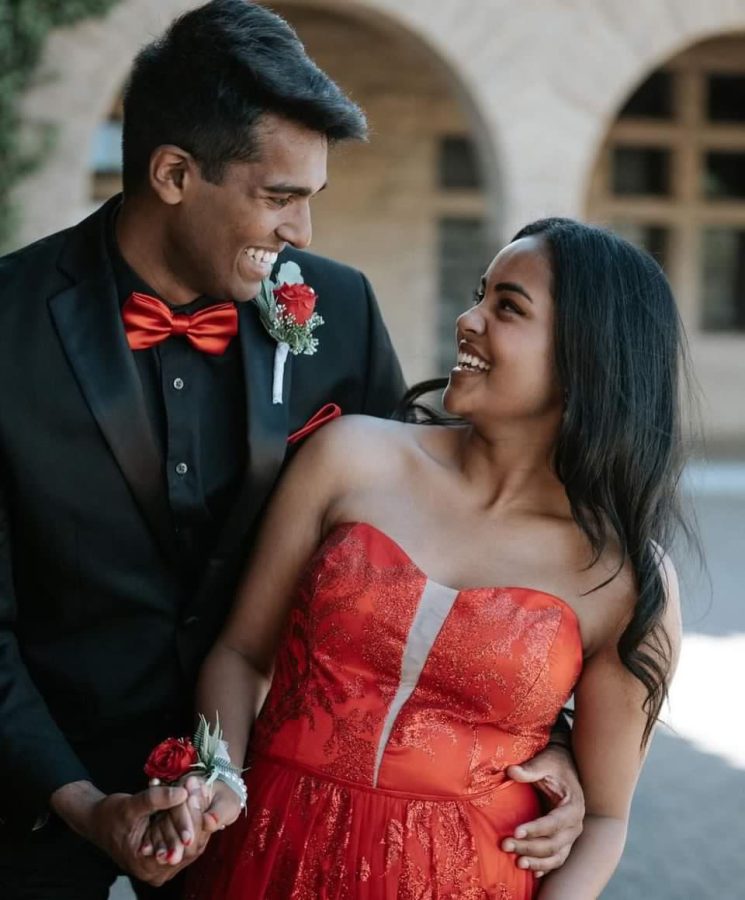The controversy behind public promposals
Exploring the MVHS community’s opinions on public promposals
Senior Kushagra Srivastava and senior Suhani Vakhariya take prom photos at Stanford University. (Photo courtesy of Kushagra Srivastava | Used with permission)
June 1, 2023
For senior Kushagra Srivastava, a key component in his public promposal for his girlfriend was to buy Taco Bell for her, which was her favorite restaurant. He followed this by presenting a poster to her asking her to go to prom with him, the text on the poster displaying a pun on the restaurant’s name: “Suhani, Let’s Taco ‘Bout Prom — It’d Be Loco Not To Go!” The promposal was successful and the couple was later featured on the Instagram account @mvaskings.
“I just wanted to share my emotion with my girlfriend, and I wanted to ask her on a date,” Srivastava said. “I think [there’s a lot of ] creativity you [can] have with doing a proposal — some people do posters, some people have included some dance teams and ask. You have unlimited creativity. And I think seeing that creativity in work is just amazing to me. So when I see a promposal on campus, I love it.”
Junior Miriam Law agrees with Srivastava that promposals can take a lot of creative effort and courage for those promposing in public, but she emphasizes that the person being promposed to shouldn’t feel an obligation to say “yes.” She also adds that, to some extent, public promposals are staged: people ask their partners beforehand to make it more comfortable for the person being promposed to. Senior Tanusha Kaushik also mentions that in most cases, promposals occur when someone is in a relationship but it should still be taken into consideration that they might not like the attention.
“If I know the person and or if I’m clearly in a relationship with the person, it is mostly given that we’re going to prom together,” Kaushik said. “And [if] they [prompose] in a way that I’m comfortable with, then I would really appreciate it and feel understood.”

Agreeing with Kaushik, art teacher Brian Chow emphasizes that big gestures such as promposals are designed for people who know each other really well or are already in relationships since they want to make it fun by making an extravagant gesture. He also warns that there is a chance of getting rejected if the two people involved in a promposal aren’t close to each other, leading to hurt feelings.
“The grand gestures become [a] very small factor in terms of being meaningful in a relationship,” Chow said. “If you really want to get to know somebody or to have [a relationship] with somebody, big gestures are not the way to do it.”
Furthermore, Law explains that she thinks social media has played a big role in public promposals as relationships are romanticized on social media. She expresses that a lot of people like the idea of being cared for and given the attention which further romanticizes promposals due to the time and effort it takes to create a poster or plan out a promposal.

“A lot of relationships are romanticized because they’re so surface level on social media and not all layers of a relationship are really shown,” Law said. “It’s only like the good parts of it, like being able to go places together or being proposed to for prom.”
Although Law claims that promposals are a “high school cliche,” Srivastava demonstrates that promposals are one of the moments of high school that everyone should experience. He says that the creativity involved in asking someone to prom fascinates him because every promposal is unique and can be tailored to the person you are asking. To Srivastava, the moments of joy and enthusiasm that come along with a promposal are his favorite.
“These moments of high school, the promposal, the prom, all these moments, they may not ever happen again in our life,” Srivastava said. “You may not ever engage in those activities in your life ever again. So why miss out on the opportunity to [experience] these moments?”


















